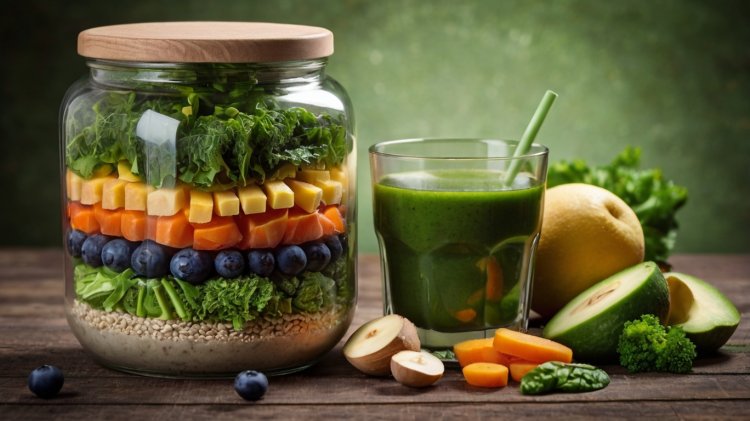Detox Diets: Myths, Facts, and How Your Body Naturally Cleanses Itself
Detox diets promise quick fixes for cleansing toxins, boosting energy, and promoting weight loss. But how effective are they really? Explore the science, potential benefits, risks, and the truth about your body's natural detox mechanisms in this comprehensive guide.

Detox Diets: Myths, Facts, and How Your Body Naturally Cleanses Itself
Detox diets have become a buzzword in the health and wellness industry, promising to flush toxins, enhance energy, and promote rapid weight loss. But do these diets deliver on their claims, or is your body already equipped with everything it needs to detox naturally? Let’s delve into the science behind detox diets, their potential benefits, risks, and what you can do to support your body's natural cleansing processes.
What Are Detox Diets?
Detox diets are typically short-term eating plans designed to eliminate toxins from your body. These diets often involve:
- Fasting: A period of no or limited food intake.
- Juicing: Drinking only fruit and vegetable juices.
- Herbs and Supplements: Incorporating products claimed to enhance detoxification.
- Colon Cleansing: Methods such as enemas or laxatives to clear the digestive system.
Advocates claim these approaches cleanse the liver, eliminate harmful substances, and rejuvenate the body.
How Does Your Body Naturally Detoxify?
Your body has its own efficient detox system, primarily managed by:
- Liver: Filters toxins and metabolizes harmful substances into water-soluble compounds for elimination.
- Kidneys: Flush out waste and toxins through urine.
- Lungs: Remove carbon dioxide and filter pollutants.
- Skin: Eliminates toxins through sweat.
- Digestive System: Expels waste products via feces.
This complex system works continuously, reducing the need for additional detox regimens.
Common Detox Methods and Their Claims
1. Fasting
Fasting is often touted to "reset" the body. While short-term fasting can offer some benefits like reduced calorie intake, prolonged fasting can lead to nutrient deficiencies and fatigue.
2. Juicing and Liquid Diets
Replacing meals with fruit and vegetable juices is said to promote toxin elimination. However, these diets often lack protein, fats, and essential nutrients needed for energy and repair.
3. Herbal Supplements and Teas
Herbal remedies claim to aid detoxification. However, many lack regulation and scientific validation. Overuse can cause dehydration and harm organs like the liver and kidneys.
4. Colon Cleansing
Enemas and laxatives are used to "clean" the digestive tract. While useful in medical settings, overuse can lead to dehydration, electrolyte imbalances, and dependency.
Do Detox Diets Work?
The effectiveness of detox diets is highly debated:
- Toxins Undefined: Detox diets rarely specify which toxins they target.
- Temporary Effects: Weight loss from detoxes is often due to water loss, not fat reduction.
- Lack of Evidence: Scientific studies on the benefits of detox diets are limited and inconclusive.
Potential Benefits of Detox Diets
Although the science behind detox diets is questionable, certain aspects may promote health:
- Avoiding Processed Foods: Reducing sugar, alcohol, and processed foods can improve energy and digestion.
- Increased Hydration: Drinking more water supports natural detoxification.
- Boosting Nutrient Intake: Consuming fruits and vegetables provides vitamins, antioxidants, and fiber.
Risks and Side Effects of Detox Diets
While detox diets are generally safe for healthy individuals, extreme practices can pose risks:
- Calorie Restriction: Leads to fatigue, irritability, and nutrient deficiencies.
- Overuse of Supplements: Can cause toxicity, dehydration, or kidney damage.
- Disrupted Metabolism: Prolonged fasting can slow metabolic rate.
- Short-Term Fix: Benefits are often temporary and unsustainable.
Who Should Avoid Detox Diets?
- Pregnant or breastfeeding individuals.
- People with diabetes or blood sugar issues.
- Adolescents or older adults.
- Those with eating disorders or chronic health conditions.
Safer and More Effective Alternatives
1. Hydration
Drink plenty of water to help your kidneys and liver function optimally.
2. Balanced Diet
Incorporate whole foods like vegetables, fruits, lean proteins, and whole grains.
3. Regular Exercise
Exercise promotes circulation and sweating, aiding in the removal of waste.
4. Quality Sleep
Adequate sleep supports cellular repair and detoxification.
5. Limit Alcohol and Sugar
Cutting back on these substances reduces the burden on your liver and pancreas.
FAQs About Detox Diets
1. What foods are good for detoxing?
Focus on whole foods such as leafy greens, cruciferous vegetables, fruits like citrus, lean proteins, nuts, and seeds.
2. Do detox diets help with weight loss?
While they may cause short-term weight loss due to reduced calorie intake, the effects are often temporary. Long-term weight management requires sustainable lifestyle changes.
3. Are detox diets safe?
Most detox diets are safe for healthy individuals if done for a short period. However, extreme regimens can lead to side effects like dehydration and nutrient deficiencies.
4. Can I detox naturally without a diet?
Yes! Your body detoxes naturally. Staying hydrated, eating a balanced diet, and exercising regularly support this process.
5. Are there toxins that detox diets can’t remove?
Certain persistent toxins, like heavy metals, accumulate in fat tissue and are not easily eliminated. A healthy diet and lifestyle can reduce exposure to such toxins over time.
Conclusion
Detox diets may seem like a quick fix for improving health, but they are often unnecessary and lack scientific support. Instead, focus on nurturing your body's natural detoxification system through hydration, balanced nutrition, exercise, and quality sleep. Remember, a sustainable and holistic approach to wellness is more effective than any fad diet.









